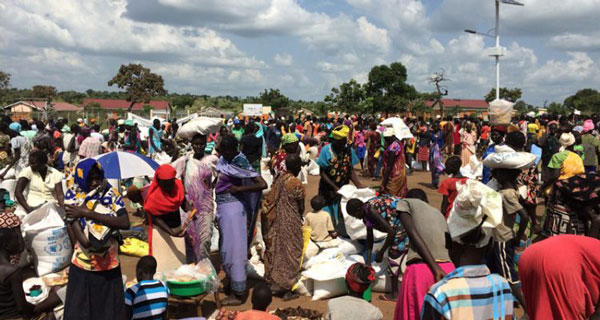
Kampala, Uganda | THE INDEPENDENT | As the other settlement areas have been filled up with refugees, new land is made ready for new arrivals of refugees from DR Congo in Mararatu. Grass and shrubs are burnt and plots made available.
Desperate refugees in Uganda are adopting grim survival tactics due to the critical under funding of the humanitarian response.
People are getting into debt, they are skipping meals to save food, parents are selling off their daughters and asylum seekers are engaging in ‘survival sex’ to make ends meet, says a briefing note released by the Norwegian Refugee Council.
Uganda is currently hosting over 1.3 million refugees and asylum seekers. Most of these have fled conflicts in South Sudan, the Democratic Republic of Congo, and Burundi. But despite the overwhelming numbers, the Refugee Response Plan is just 39 percent funded as of December 2019.
Uganda’s progressive refugee policies allow freedom of movement and freedom to work, but most refugees still live in extreme poverty and food insecurity, more than 80 per cent of them living below the international poverty line of USD 1.90 a day. As a result, refugees are adopting harmful practices to survive and are exposed to grave protection risks because they have little to no access to basic services such as food, shelter, health or livelihoods.
Ulrika Blom, the Country Director for the Norwegian Refugee Council (NRC) observes that Uganda is at breaking point, struggling to cope with the humanitarian needs of a growing refugee population who in turn, are facing debt and danger because there is no funding available for an adequate response.
According to the note, focus group interviews found that Congolese refugees living in Kyangwali settlement along the Uganda/DRC border are selling food rations to make rent and are taking out loans with 50 per cent interest rates. Many parents are skipping meals, often for days, to ensure their children get enough to eat.
Research conducted earlier by REACH, a humanitarian initiative providing granular data and in-depth analysis from contexts of crisis, disaster and displacement indicates that refugees typically run out of food assistance around two weeks after receiving it, while parents often forego meals to ensure their children get enough food.
Tabu (30), a refugee who fled to Uganda from DRC with her children earlier this year says that “There is never enough food. People sleep outside because the rooms are so overcrowded.
Some other refugees also told how they sell part of their food distribution to cover other needs. “When maize is distributed, they often sell half of their distributed food to get transport to town and pay someone to grind the pellet maize into flour,” the report says. It adds that others sell part of their rations to buy firewood or charcoal to cook their meals.
Selling food is also used as a coping mechanism to pay for medicine for family members, or to buy other essential items. For example, 20 per cent of households surveyed in Kyangwali, had sold food assistance as a coping mechanism in the previous 30 days.
Refugee parents also told the Norwegian Refugee Council staff how they are arranging child marriages for their daughters to give their family security. Lack of adequate housing or shelter is exposing female head households to sexual and gender-based violence (SGBV). Some female asylum seekers have admitted to engaging in ‘survival sex’ to make ends meet.
“This is what funding gaps look like. These grim coping strategies are an appalling indictment of our inability as humanitarians to provide the most basic support to vulnerable refugees. It further illustrates the international community’s cavalier approach to responsibility-sharing and it must end now,” added Blom.
The Norwegian Refugee Council is urging donors to increase funding for Uganda for 2020 or risk the country potentially taking regressive policy measures towards refugees in the future. “If these funding gaps continue, we risk Uganda ending its progressive open-door policy and shutting its doors on refugees for good,” Blom said.
Blom adds that if funding gaps of this magnitude continue, we could see Uganda following in the footsteps of neighbouring countries like Tanzania and Kenya and take regressive steps towards its open-door policy and undo years of positive work in welcoming refugees.
The report comes barely a day after the UN Secretary General Antonio Guterres appealed that more must be done to protect refugees, respect their rights and address the reasons why people leave their homes in the first place. Guterres was speaking at the Global Refugee Forum in Geneva, meeting for the first time on Tuesday.
******
URN
 The Independent Uganda: You get the Truth we Pay the Price
The Independent Uganda: You get the Truth we Pay the Price


